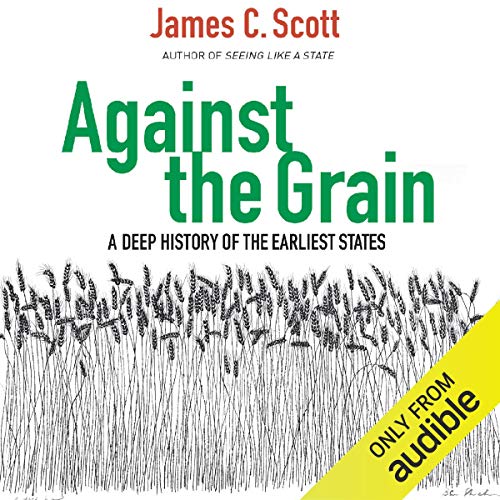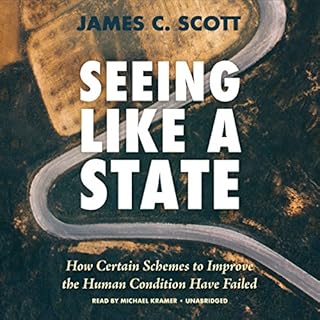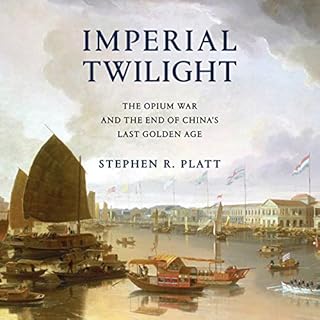
Against the Grain
A Deep History of the Earliest States
Failed to add items
Add to Cart failed.
Add to Wish List failed.
Remove from wish list failed.
Follow podcast failed
Unfollow podcast failed
Buy Now for $31.26
No default payment method selected.
We are sorry. We are not allowed to sell this product with the selected payment method
-
Narrated by:
-
Eric Jason Martin
-
Written by:
-
James C. Scott
About this listen
An account of all the new and surprising evidence now available for the beginnings of the earliest civilizations that contradict the standard narrative
Why did humans abandon hunting and gathering for sedentary communities dependent on livestock and cereal grains and governed by precursors of today's states? Most people believe that plant and animal domestication allowed humans, finally, to settle down and form agricultural villages, towns, and states, which made possible civilization, law, public order, and a presumably secure way of living. But archaeological and historical evidence challenges this narrative. The first agrarian states, says James C. Scott, were born of accumulations of domestications: first fire, then plants, livestock, subjects of the state, captives, and finally women in the patriarchal family - all of which can be viewed as a way of gaining control over reproduction.
Scott explores why we avoided sedentism and plow agriculture, the advantages of mobile subsistence, the unforeseeable disease epidemics arising from crowding plants, animals, and grain, and why all early states are based on millets and cereal grains and unfree labor. He also discusses the "barbarians" who long evaded state control, as a way of understanding continuing tension between states and nonsubject peoples.
©2017 Yale University (P)2017 Audible, Inc.You may also enjoy...
-
Seeing Like a State
- Written by: James C. Scott
- Narrated by: Michael Kramer
- Length: 16 hrs and 6 mins
- Unabridged
-
Overall4.5 out of 5 stars 22
-
Performance4 out of 5 stars 19
-
Story4.5 out of 5 stars 18
Why do well-intentioned plans for improving the human condition go tragically awry? Author James C. Scott analyzes failed cases of large-scale authoritarian plans in a variety of fields. Centrally managed social plans misfire, Scott argues, when they impose schematic visions that do violence to complex interdependencies that are not - and cannot - be fully understood. Further, the success of designs for social organization depends upon the recognition that local, practical knowledge is as important as formal, epistemic knowledge.
-
2 out of 5 stars
-
Disappointing
- By unixd0od on 2022-05-12
Written by: James C. Scott
-
The Map of Knowledge
- A Thousand-Year History of How Classical Ideas Were Lost and Found
- Written by: Violet Moller
- Narrated by: Susan Duerden
- Length: 8 hrs and 46 mins
- Unabridged
-
Overall4.5 out of 5 stars 2
-
Performance4.5 out of 5 stars 2
-
Story4 out of 5 stars 2
The foundations of modern knowledge - philosophy, math, astronomy, geography - were laid by the Greeks, whose ideas were written on scrolls and stored in libraries across the Mediterranean and beyond. But as the vast Roman Empire disintegrated, so did appreciation of these precious texts. Christianity cast a shadow over so-called pagan thought, books were burned, and the library of Alexandria, the greatest repository of classical knowledge, was destroyed. Yet some texts did survive and The Map of Knowledge explores the role played by seven cities around the Mediterranean....
Written by: Violet Moller
-
Dominion
- The Railway and the Rise of Canada
- Written by: Stephen Bown
- Narrated by: Wayne Ward
- Length: 12 hrs and 4 mins
- Unabridged
-
Overall4.5 out of 5 stars 19
-
Performance4.5 out of 5 stars 18
-
Story4.5 out of 5 stars 18
In the late 19th century, demand for fur was in sharp decline. This could have spelled economic disaster for the venerable Hudson's Bay Company. But an idea emerged in political and business circles in Ottawa and Montreal to connect the disparate British colonies into a single entity that would stretch from the Atlantic to the Pacific. With over 3,000 kilometers of track, much of it driven through wildly inhospitable terrain, the CPR would be the longest railroad in the world and the most difficult to build. Its construction was the defining event of its era.
-
4 out of 5 stars
-
Fascinating story, great story-telling, but with significant progressive moralizing
- By David Selke on 2024-03-26
Written by: Stephen Bown
-
Imperial Twilight
- The Opium War and the End of China's Last Golden Age
- Written by: Stephen R. Platt
- Narrated by: Mark Deakins
- Length: 17 hrs and 50 mins
- Unabridged
-
Overall4.5 out of 5 stars 39
-
Performance4.5 out of 5 stars 31
-
Story4.5 out of 5 stars 31
As one of the most potent turning points in the country's modern history, the Opium War has since come to stand for everything that today's China seeks to put behind it. In this dramatic, epic story, award-winning historian Stephen Platt sheds new light on the early attempts by Western traders and missionaries to "open" China even as China's imperial rulers were struggling to manage their country's decline and Confucian scholars grappled with how to use foreign trade to China's advantage.
-
3 out of 5 stars
-
Well written but not the story I was hoping for
- By Simon on 2022-02-03
Written by: Stephen R. Platt
-
The Earth Transformed
- An Untold History
- Written by: Peter Frankopan
- Narrated by: Peter Frankopan
- Length: 29 hrs and 11 mins
- Unabridged
-
Overall4.5 out of 5 stars 4
-
Performance4 out of 5 stars 4
-
Story4.5 out of 5 stars 4
Global warming is one of the greatest dangers mankind faces today. Even as temperatures increase, sea levels rise, and natural disasters escalate, our current environmental crisis feels difficult to predict and understand. But climate change and its effects on us are not new. In a bold narrative that spans centuries and continents, Peter Frankopan argues that nature has always played a fundamental role in the writing of history.
-
3 out of 5 stars
-
Detailed and scholarly
- By Andrew Dunn on 2024-03-05
Written by: Peter Frankopan
-
Two Cheers for Anarchism
- Six Easy Pieces on Autonomy, Dignity, and Meaningful Work and Play
- Written by: James C. Scott
- Narrated by: Jeremy Arthur
- Length: 4 hrs and 38 mins
- Unabridged
-
Overall3.5 out of 5 stars 3
-
Performance4.5 out of 5 stars 3
-
Story3.5 out of 5 stars 3
James Scott taught us what's wrong with seeing like a state. Now, in his most accessible and personal book to date, the acclaimed social scientist makes the case for seeing like an anarchist. Inspired by the core anarchist faith in the possibilities of voluntary cooperation without hierarchy, Two Cheers for Anarchism is an engaging, high-spirited, and often very funny defense of an anarchist way of seeing - one that provides a unique and powerful perspective on everything from everyday social and political interactions to mass protests and revolutions.
Written by: James C. Scott
-
Seeing Like a State
- Written by: James C. Scott
- Narrated by: Michael Kramer
- Length: 16 hrs and 6 mins
- Unabridged
-
Overall4.5 out of 5 stars 22
-
Performance4 out of 5 stars 19
-
Story4.5 out of 5 stars 18
Why do well-intentioned plans for improving the human condition go tragically awry? Author James C. Scott analyzes failed cases of large-scale authoritarian plans in a variety of fields. Centrally managed social plans misfire, Scott argues, when they impose schematic visions that do violence to complex interdependencies that are not - and cannot - be fully understood. Further, the success of designs for social organization depends upon the recognition that local, practical knowledge is as important as formal, epistemic knowledge.
-
2 out of 5 stars
-
Disappointing
- By unixd0od on 2022-05-12
Written by: James C. Scott
-
The Map of Knowledge
- A Thousand-Year History of How Classical Ideas Were Lost and Found
- Written by: Violet Moller
- Narrated by: Susan Duerden
- Length: 8 hrs and 46 mins
- Unabridged
-
Overall4.5 out of 5 stars 2
-
Performance4.5 out of 5 stars 2
-
Story4 out of 5 stars 2
The foundations of modern knowledge - philosophy, math, astronomy, geography - were laid by the Greeks, whose ideas were written on scrolls and stored in libraries across the Mediterranean and beyond. But as the vast Roman Empire disintegrated, so did appreciation of these precious texts. Christianity cast a shadow over so-called pagan thought, books were burned, and the library of Alexandria, the greatest repository of classical knowledge, was destroyed. Yet some texts did survive and The Map of Knowledge explores the role played by seven cities around the Mediterranean....
Written by: Violet Moller
-
Dominion
- The Railway and the Rise of Canada
- Written by: Stephen Bown
- Narrated by: Wayne Ward
- Length: 12 hrs and 4 mins
- Unabridged
-
Overall4.5 out of 5 stars 19
-
Performance4.5 out of 5 stars 18
-
Story4.5 out of 5 stars 18
In the late 19th century, demand for fur was in sharp decline. This could have spelled economic disaster for the venerable Hudson's Bay Company. But an idea emerged in political and business circles in Ottawa and Montreal to connect the disparate British colonies into a single entity that would stretch from the Atlantic to the Pacific. With over 3,000 kilometers of track, much of it driven through wildly inhospitable terrain, the CPR would be the longest railroad in the world and the most difficult to build. Its construction was the defining event of its era.
-
4 out of 5 stars
-
Fascinating story, great story-telling, but with significant progressive moralizing
- By David Selke on 2024-03-26
Written by: Stephen Bown
-
Imperial Twilight
- The Opium War and the End of China's Last Golden Age
- Written by: Stephen R. Platt
- Narrated by: Mark Deakins
- Length: 17 hrs and 50 mins
- Unabridged
-
Overall4.5 out of 5 stars 39
-
Performance4.5 out of 5 stars 31
-
Story4.5 out of 5 stars 31
As one of the most potent turning points in the country's modern history, the Opium War has since come to stand for everything that today's China seeks to put behind it. In this dramatic, epic story, award-winning historian Stephen Platt sheds new light on the early attempts by Western traders and missionaries to "open" China even as China's imperial rulers were struggling to manage their country's decline and Confucian scholars grappled with how to use foreign trade to China's advantage.
-
3 out of 5 stars
-
Well written but not the story I was hoping for
- By Simon on 2022-02-03
Written by: Stephen R. Platt
-
The Earth Transformed
- An Untold History
- Written by: Peter Frankopan
- Narrated by: Peter Frankopan
- Length: 29 hrs and 11 mins
- Unabridged
-
Overall4.5 out of 5 stars 4
-
Performance4 out of 5 stars 4
-
Story4.5 out of 5 stars 4
Global warming is one of the greatest dangers mankind faces today. Even as temperatures increase, sea levels rise, and natural disasters escalate, our current environmental crisis feels difficult to predict and understand. But climate change and its effects on us are not new. In a bold narrative that spans centuries and continents, Peter Frankopan argues that nature has always played a fundamental role in the writing of history.
-
3 out of 5 stars
-
Detailed and scholarly
- By Andrew Dunn on 2024-03-05
Written by: Peter Frankopan
-
Two Cheers for Anarchism
- Six Easy Pieces on Autonomy, Dignity, and Meaningful Work and Play
- Written by: James C. Scott
- Narrated by: Jeremy Arthur
- Length: 4 hrs and 38 mins
- Unabridged
-
Overall3.5 out of 5 stars 3
-
Performance4.5 out of 5 stars 3
-
Story3.5 out of 5 stars 3
James Scott taught us what's wrong with seeing like a state. Now, in his most accessible and personal book to date, the acclaimed social scientist makes the case for seeing like an anarchist. Inspired by the core anarchist faith in the possibilities of voluntary cooperation without hierarchy, Two Cheers for Anarchism is an engaging, high-spirited, and often very funny defense of an anarchist way of seeing - one that provides a unique and powerful perspective on everything from everyday social and political interactions to mass protests and revolutions.
Written by: James C. Scott








